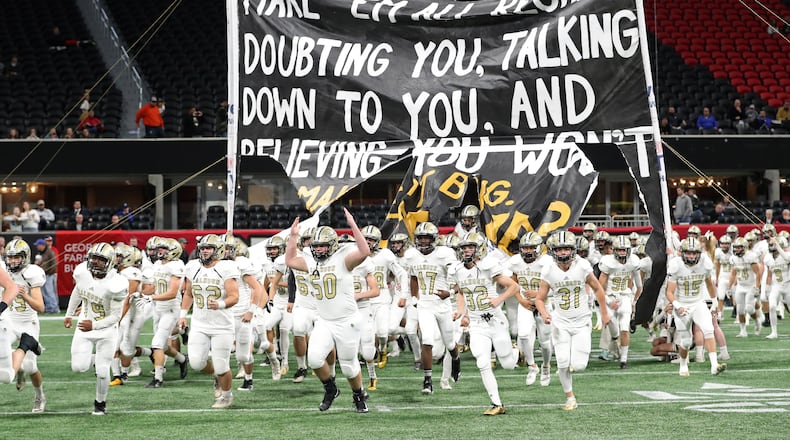Today’s interviewee is Calhoun athletic director and assistant principal Brock Holley. Calhoun, Jefferson and Cartersville presented a proposal to the GHSA reclassification committee on Monday that Holley believes more fairly classifies city schools such as his. The proposal would use the GHSA’s 2.0 multiplier only on out-of-zone students who participate in GHSA activities. Holley makes his case by presenting data on state championships won by city, private and county schools.
Brock Holley, Calhoun athletic director
1. Most reclassification committee members indicated Monday that they want to increase the out-of-zone multiplier to 2.5 or 3.0 from the current 2.0. What are your thoughts on this multiplier increase? “First off, I’d like to thank the reclassification committee and the GHSA office staff for their commitment to supporting and growing high school athletics in the state of Georgia. My thoughts are that we should look at the data from last year to see what the issues are and if the current 2.0 multiplier is working. I felt strongly that it was important to find that data and present it to the reclassification committee so they could make an informed decision. In my opinion, making decisions based on perceptions alone is a slippery slope, especially when we have relevant data available.”
2. What did your research show about the sports success of city schools relative to county and private schools? “The research shows that private schools are winning state championships at a much higher rate than any public schools, city or county. During the 2020-2021 school year, private schools won 42 state championships. Westminster won 10, Marist nine, Pace six, Lovett five, Blessed Trinity four, Woodward four, St. Pius three, GAC one in classifications 2A - 5A. Eight private schools won over 40% of the available state championships in 2A-5A. Of the nine private schools placed in classifications above 1A, eight won state championships. In my opinion, this level of dominance shows a lack of competitive balance; however, the private schools recognize this issue and are trying to work with the GHSA to find a solution agreeable for all involved. For public schools, both city and county, the data is different. City schools, defined as the only high school in a city school district, won 10 total state championships or 6% of the available state championships in classes 2A-7A during 2020-2021. Marietta won three, Buford three, Carrollton two, Dalton one, Jefferson one. Of the 14 total city schools, nine did not win a state championship in 2020-2021. In my opinion, winning 6% of the available state championships is far from dominant. County schools or any school not classified as a private or city school account for the largest group of member schools within the GHSA. In classifications 2A-7A, county schools won 104 state championships or 67% of the available state championships. Examples of county school success include McIntosh with four state titles, North Oconee with four and Johns Creek with four.
“Another way to examine the data is to look at the number of state championships won by the top nine schools in each category: The top nine private schools won 42 state championships, the top nine city schools won 10 state championships, and the top nine county schools won 26 state championships.
“Lastly, I examined the success of public schools, city and county, based on their percentage of out-of-district students. From a sample of 83 public schools, schools with an out-of-district population less than 10% of their student body won 80% or 66 state championships. Schools with more than 10% of out-of-district students won 20% or 17 state championships during 2020-2021. This data clearly shows that schools with a higher percentage of out-of-district students are not winning more state championships. In fact, schools with low out-of-district student populations are winning considerably more state championships. From the public schools mentioned above, Marietta, Dalton, McIntosh, North Oconee and Johns Creek all have out-of-district student populations less than 10%.
“These are facts from last year’s state championship results. In my opinion, the facts should at least be considered when discussing reclassification and an out-of-district multiplier instead of solely focusing on perceptions.”
3. What do you believe is a better plan to reclassify schools? “Reclassifying schools is not an easy process, and there is no way to make everybody happy. Having said that, for public schools, I believe the proposal we submitted on Monday is a fair model to use based on the state championship data from last year. Our proposal uses the existing 2.0 multiplier but only applies it to students who participate in GHSA activities. For more information on the proposals, I encourage people to read the details of each on the GHSA website.”
4. Do you favor the private schools’ plan to use competitive balance to classify their sports teams? “From my conversations with private-school athletic directors, the consensus is that the private schools and the GHSA agree that some type of action is necessary based on the state championship data above. I believe the competitive-balance model that the private schools have submitted is a reasonable way to adjust private-school classifications based on sport-specific success. If a private school has a certain amount of success in certain sport, they would be moved up for that sport. I have not read every detail of their proposal, but I do think it is a good first step in a joint conversation between private schools and the GHSA. I’ve also heard from private-school ADs that they want to continue being a part of the GHSA and they value their membership with the organization.”
Produced by Georgia High School Football Daily, a free e-mail newsletter. To join the mailing list, click here.
About the Author
The Latest
Featured


